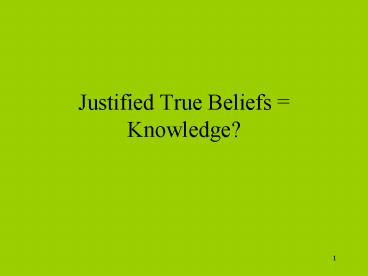Justified True Beliefs Knowledge - PowerPoint PPT Presentation
1 / 13
Title:
Justified True Beliefs Knowledge
Description:
He believes this because this is what his friend told him. But this is a pure guess of his friend. ... 'justified true belief' is not the definition of knowledge. ... – PowerPoint PPT presentation
Number of Views:215
Avg rating:3.0/5.0
Title: Justified True Beliefs Knowledge
1
Justified True Beliefs Knowledge?
2
Justified True Beliefs?
- Descartes and Locke agree that justified true
beliefs are identical to knowledge, although they
disagree how knowledge is ultimately justified. - Whether knowledge is justified by reason or
experience, justification is considered to be a
psychological process--whether a person is
justified in believing something depends on what
she is conscious of. - But does this conception of knowledge corresponds
to our common sense?
3
Justified True Beliefs?
- In fact, this conception has been challenged in
two ways - Are all justified true beliefs knowledge?
- To ask this question is to ask whether (i) being
true and (ii) being justified form a sufficient
condition for a belief to be knowledge. - Is all knowledge justified true beliefs?
- To ask this question is to ask whether (i) being
true and (ii) being justified are necessary
conditions for a belief to be knowledge.
4
Some justified true belief is not knowledge
- Consider the 1st question Are all justified true
beliefs knowledge? - Suppose You have seen me putting a 10 coin into
my pocket and believe that I have (at least) 10
in my pocket. - According to common sense, under normal
situations, your perception provides good
justification for your belief. - So you have a justified true belief that I have
10 in my pocket. - So , under normal situations, you know that I
have 10 in my pocket.
5
Some justified true belief is not knowledge
- However suppose further that my pocket has a hole
and the coin has dropped out of my pocket through
the hole. - However, there is still a 10 note in my pocket
you have not seen. So your belief that I have 10
in my pocket is still true. - Your belief is justified because you have the
same justification as in normal situations. - Therefore, you still have justified true belief
that I have 10 in my pocket.
6
Some justified true belief is not knowledge
- However, common sense tells us that you do not
know that I have 10 in my pocket. - This shows that being true and being justified
are not sufficient for a belief to be knowledge.
7
Objection
- Some argue that you are not justified to believe
that I have 10 in my pocket because you infer
this conclusion from a false premise, i.e., I
have a 10 coin in my pocket. - No conclusion is justified if it is inferred from
a false premise. - We should add this no-false-premise-principle to
the criterion of justification.
8
Response
- The addition of no-false-premise-principle cannot
exclude all counterexamples. - Suppose You have seen me putting a fake 10 coin
into my pocket (although you do not know that
that is a fake one) and believe that I have 10
in my pocket. - I, coincidentally, have a 10 coin in my pocket.
9
Response
- In this case, your belief is inferred from a true
premise, i.e., I have a 10 coin in my pocket. - But common sense tells us that you still do not
know that I have (at least) 10 in my pocket. - The above cases show that for a justified true
belief to be knowledge, the beliefs
justification must be related to what makes the
belief true.
10
Some knowledge is not justified true belief
- Consider the 2nd question Is all knowledge
justified true beliefs? - You believe that the sum of interior angles of a
triangle is equal to 2 right angles. - However, you forget how to do a geometrical proof
for this, even though you knew how to do it in
the past. - Moreover, you would understand the proof if you
see it again.
11
Some knowledge is not justified true belief
- Consider a child who also believe that the sum of
interior angles of a triangle is equal to 2 right
angles. - He believes this because this is what his friend
told him. But this is a pure guess of his friend. - He would not understand the proof if it is
presented to him. - According to common sense, you, but not the
child, know that the sum of interior angles of a
triangle is equal to 2 right angles.
12
Some knowledge is not justified true belief
- So, although you cannot justify your belief,
according to common sense, you still know that
the sum of interior angles of a triangle is equal
to 2 right angles. - This shows that being being justified are not
necessary for a belief to be knowledge.
13
Conclusion
- So being true and being justified are neither
sufficient nor necessary for a belief to be
knowledge in our commonsense. - I.e. justified true belief is not the
definition of knowledge. - But the fact that we do not know the definition
of knowledge does not imply that we dont know
anything.

